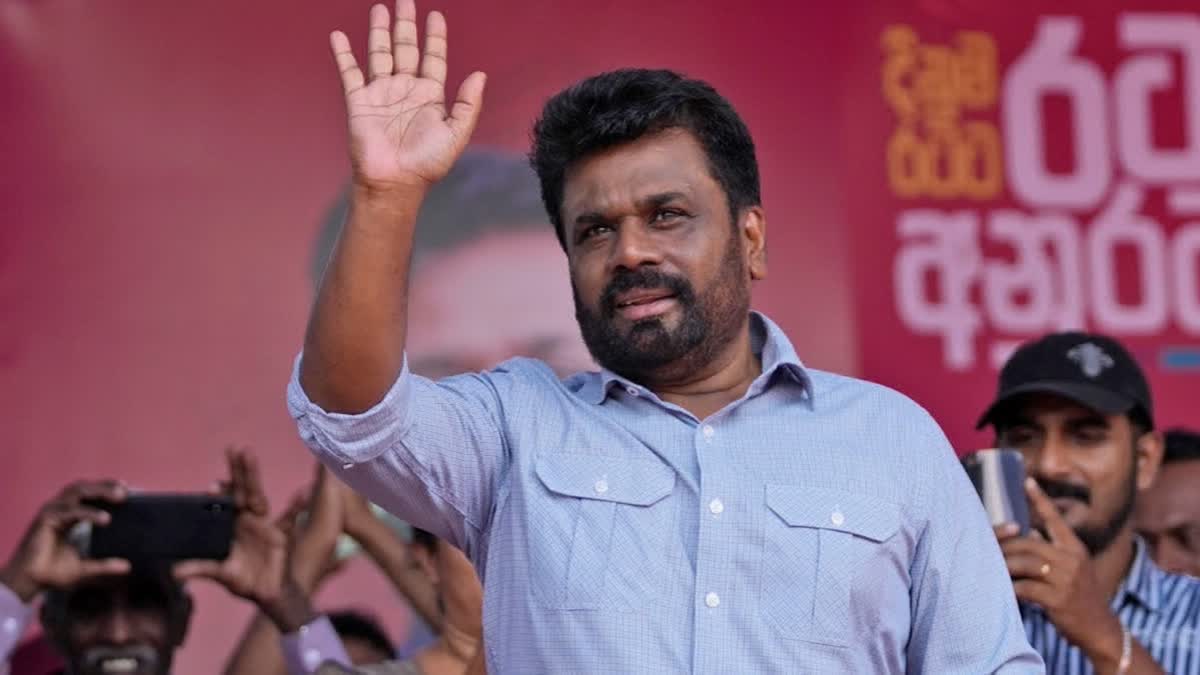New Delhi: In the realm of changing geopolitical landscape, India-Sri Lanka ties have seen several twists and turns. The Ministry of External affairs on Friday officially announced the state visit of the newly elected Sri Lankan President Anura Dissanayake to New Delhi from 15-17 December. This will be the first bilateral visit of President Dissanayake to India after the recently concluded presidential and parliamentary elections in Sri Lanka. The visit is expected to be instrumental in strengthening the relations between both countries.
This also comes at a time the island nation is still recovering from its worst-ever financial debt in 2022. The visit assumes significance given China’s growing influence in Sri Lanka and the fact that after his India visit, Dissanayake is all set to visit Beijing next month. Experts view the timing of Dissanayake’s visit to New Delhi as significant.
A former Indian diplomat and foreign policy commentator, Ashok Sajjanhar told ETV Bharat that these are indeed early days, and it's essential to observe closely the evolving trajectory of Sri Lanka's foreign relations. However, it’s important to recognize the significant message being conveyed by the Sri Lankan president choosing India as the first destination for his visit.
“For instance, when leaders want to communicate a specific alignment, we can see this in Nepal, where K.P. Sharma—serving multiple terms—visits China first, signalling a desire to strengthen ties with Beijing. Similarly, when Muizzu took office, his initial priorities included Turkey, the UAE, and China, before finally reaching out to India. These actions send clear signals. The message from Sri Lanka’s president is unmistakable: they are committed to fostering strong and positive relations with India. This partnership is a cornerstone they aim to maintain moving forward”, added Sajjanhar.
When asked about the significance of the visit for enhancing bilateral trade and investment between India-Sri Lanka, Sajjanhar said, “India has a free trade agreement with Sri Lanka, and we are discussing ways to upgrade it to a Comprehensive Economic Partnership Agreement. This is important because India is now a large market and economy. Currently, Sri Lanka's export potential is limited. It mainly relies on textiles, tea, and tourism. These sectors suffered greatly during COVID and from the coordinated Easter bomb attacks in Sri Lanka. By expanding trade and economic engagement with India and forming investment partnerships, Sri Lanka can strengthen its economy. It can diversify its exports and reduce dependence on just a few items”.
During his visit, President Dissanayake will meet President Murmu and hold discussions with Prime Minister Narendra Modi on bilateral issues of mutual interest. He will also participate in a business event in Delhi to promote investment and commercial linkages between India and Sri Lanka. Further, he will visit Bodh Gaya as part of the visit.
Meanwhile, Sripathi Narayanan, a foreign and security policy analyst, based in New Delhi, said, “The President's visit to India was expected, especially because of the recent elections. His arrival was delayed after he became President, as he waited for the parliamentary polls to happen. Now that those polls are over, it is a positive development for India that he chose to visit first, before going to other countries like China. This shows that India is a priority for him. It's also important to note that A.K.D, the President, is connected to the JVP, which stands for Janatha Vimukthi Peramuna.
The JVP has a history as a militant group that has been anti-India. His visit is meant to show that he is changing how people view his political party, and that people can change over time. Dissanayake won the parliamentary elections decisively, gaining support from many different groups, including conservative and non-conservative Sinhalas, Muslims, and Tamils. Traditional parties that used to represent these groups did not perform well in the elections. This means that he is not just representing one group but the hopes of many voters across the country. This is a significant moment for the JVP, as it has expanded its support beyond its usual base. The President now represents the entire nation”.
“On the economic side, he won because many political parties have faced problems and lost people's trust. The economy is struggling, and the public hopes this new leader can help improve it. Regarding Sri Lanka's foreign policy, the visit does not imply a major change in its relations with India and China. Historically, in the late 1980s and early 1990s, Sri Lanka leaned more toward India and did not act against it. Their ties with China were mostly about commercial needs. Thus, while there may be some changes, the overall approach to foreign policy remains tied to historical relationships”, added the analyst.
One of the key topics of discussion during the visit is expected to be Sri Lanka's debt crisis and its ongoing economic recovery. China is the largest creditor to Sri Lanka, holding more than half of its bilateral debt. Dissanayake plans to focus on discussions with China during his presidency. He will visit Beijing in January to negotiate further. Sri Lanka faces a challenge in balancing its relationships with India and China.
The country needs to manage these relationships carefully as it seeks financial help and stability for the long term. Sri Lanka is currently addressing the challenges of a $46 billion foreign debt default and a currency collapse, which has resulted in shortages of food, fuel, and medicine. This situation presents an opportunity for the country to strengthen its foreign relations, particularly with India and China, as it navigates these difficulties and seeks support for recovery.
According to the Ministry of External Affairs, Sri Lanka is India’s closest maritime neighbour in the Indian Ocean Region (IOR) and holds a central place in the Prime Minister’s vision of ‘SAGAR’ (Security and Growth for All in the Region) and India’s ‘Neighbourhood First’ policy. The visit of President Dissanayake to India is expected to further strengthen the multi-faceted and mutually beneficial cooperation between the two countries.
